We're planning a feature story and need your help. What's it about? The secrets of the top social networkers—we're not seeking rock stars per se, but rather rock star ideas (Mack Collier made this point in a recent blog post). However, we do want to focus on the people themselves—those who do something really well or have an approach that's distinctive and unique. We'll make a final selection and ask these folks for a first-person account. While this won't be so much about the tools themselves, it'd be nice to have a broad representation. To name just a few: Blip.TV Delicious Facebook Flickr Glogster GoodReads Google Apps LibraryThing Meebo Ning PBWiki Second LifeSlideShare Twitter YouTube VoiceThread Wikipedia Mobile apps Screencasting Other community sites Casting as wide a net as I can here—since we can learn a great deal, I think, from those outside our immediate communities—I'm considering not just school librarians, but public library people, tech specialists, K-12 educators, administrators, vendors, and nonprofits, including library and education organizations, authors, publishers, book folk, academic libraries... So if you have any ideas or know of a great, creative user, let me know. Thanks very much. Looking forward to hearing from you. Kathy Ishizuka Technology Editor School Library Journal@kishizuka @sljournal SLJ on Facebook
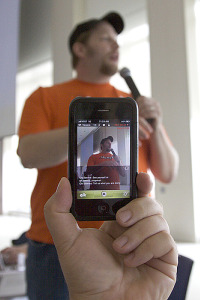 I'm often surprised and delighted by what I find on Twitter. And today was no exception when I saw that Chris Brogan posted to his blog a reflection on, of all things, libraries and more pointedly, how they are evolving. Brogan, a social media expert who is genuinely a social media expert, is coauthor with Julien Smith of the best-selling book Trust Agents. Here's what he had to say: "I dropped off three copies of Trust Agents to my local library today, and realized a few changes since I’d last gone in (a few months or so). They’d added free wifi. They’d taken most of the new release fiction and nonfiction and stuffed it in an off-center room to make room for their ever expanding collection of feature length DVDs.
That’s right: my library has become Blockbuster.
But no, not really, and let’s not malign this, because my library is adapting to what its patrons are demanding, and they evidently want newly released movies about the mafia and aliens and anything starring Nicholas Cage or Jim Carrey. And this gets us thinking about what a library’s mission REALLY is today..."
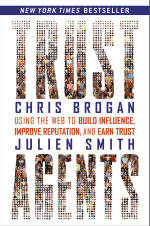 Do read the rest of his post. But the upshot is that he's welcoming a dialog here: What do libraries really stand for today? Who do they serve? How should they evolve? What are your thoughts?Brogan is addressing public libraries, but who's to say the conversation couldn't itself evolve or relate to other library services, as in K-12, let's say. Or maybe social media and libraries? Ebooks and what's ahead for readers? At the Summit, we talked about the need to engage the greater audience and getting out the message about what you do. Now seems like a good opportunity. - Kathy Ishizuka ( @kishizuka)
Photo of Chris Brogan by CC Chapman
In their own words:
For more video impressions, notes from the sessions, and more, visit the Summit Ning.
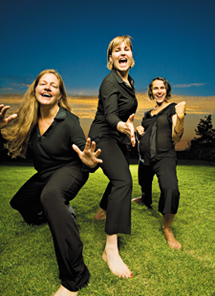 After trading several emails - she's got some very exciting ideas about school libraries - I met Lisa Layera Brunkan in the hall (where some of the best stuff happens, no?). Much has happened since the September 2008 cover story, and she'll catch us up during her keynote on Saturday at 8 - 9:30 am. Before her presentation, Lisa would like us to consider: Cultivating Indispensability: Perspectives from beyond the library community.She's also on the hunt "for stories that highlight librarians and programs from all over the country! Help us share best-practices and help build the case that not only do libraries and librarians matter, they are fundamental to flourishing in the 21st century." - Can you quantify this year's cuts to library programs in your community - are they up? down? stable?
- Do you feel that your principal, superintendent, and state leader’s ‘get’ what you do and support you in your work? If so, please share how you’re getting the word out and why you think they’re listening.
- Are you a peer coach for technology?
Please respond on the Ning. Photograph by Rick Dahms (From left): Susan McBurney, Denette Hill,and Lisa Layera Brunkan -- Kathy Ishizuka ( @kishizuka)
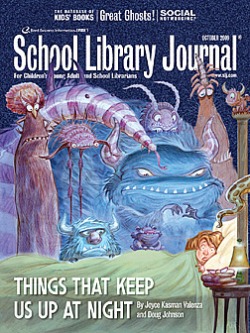 Winding my way down to DC on the Acela. En route, I've posted a link to our latest issue, October. In the feature well: Joyce Valenza and Doug Johnson on "What Keeps Us Up at Night," a discussion started at the last SLJ Summit. Judith C. Koss guides us through tricky territory: copying DVDs. Likewise, Ellyssa Kroski considers social media policies for organizations, including libraries. And rounding up the "scary" theme, ghost stories. Ahhh. Train travel so kicks air travel's butt.
Thanks to Fuse for the reminder that today, September 30, honors St. Jerome. Born in 347 CE in Stridon (modern Northeast Italy), Jerome is the patron saint of libraries and librarians, archivists, translators, and encyclopedists. According to Wikipedia, he was a bookish sort and collected both pagan and Christian tomes. His scholarly work includes important translations of the Bible and Biblical commentary. Artists have depicted St. Jerome as a half-clad hermit with cross, skull, and Bible. He is frequently accompanied by a lion from whose paw he is said to have withdrawn a thorn. That's a Caravaggio above.
A heads up on this one, folks. Howard Rheingold, Joyce Valenza, and Frances Jacobson Harris are discussing "Librarians and Truth Detection" tomorrow, Wednesday, September 30, 2009. Time: 5pm Pacific / 8pm Eastern Log in to Elluminate for the one-hour webcast.
Frances Jacobson Harris is the librarian at University Laboratory High School at the University of Illinois at Urbana-Champaign. Joyce Valenza, the librarian at Springfield Township High School in Glenside, PA, blogs at NeverEndingSearch. Both friends and admired contributors to SLJ. As for Howard Rheingold, I love this guy. Is that not obvious? We had an interesting exchange on a blog in which he asked me what I thought - which is crazy. And he gardens and handpaints his shoes. Tune in for what should be a stimulating conversation. - Kathy Ishizuka ( @kishizuka)
The Summit boasts tech support in the form of two enthusiastic 2.0 mavens: Cathy Jo Nelson and Buffy Hamilton. 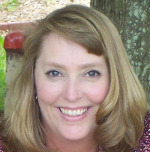 A 24-year veteran educator and teacher librarian from South Carolina, Nelson ( @cathyjo) works at Dorman High School in Roebuck, SC. Her blog, "TechnoTuesday: Cathy Nelson's Professional Thoughts," was recently named one of the Top 20 Teacher Blogs by Scholastic's Instructor Magazine.
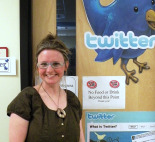 In her 18th year as an educator, Hamilton ( @buffyjhamilton) has worked primarily as a technology specialist, 9-12 English teacher, and now is a high school librarian in the Cherokee County School District. She blogs at The Unquiet Librarian.
As we prepped for the event, I asked them for some insight, 2.0 wise: What is your absolute favorite application? And your tech/2.0 fascination of the moment?Hamilton: Google Reader is probably my most powerful application—it allows me to pull and organize RSS feeds from my favorite information sources, whether it be blog feeds, journal feeds, podcast feeds, or even Twitter streams; I also love the sharing feature for finding additional resources and readings. Twitter, though, is a very close second - it was my entry point into cultivating a personal learning network. My 2.0 fascination would have to be ways I can help my students use social media for accessing, organizing, managing, and sharing information; I am also intrigued by mashups and tools for sharing citations like Zotero and CiteULike. Nelson: It is hard to nail down a single tool I am most fascinated with! Right now I am finding blogs (my own and the ones I follow) occupying the little free time I have. But they are very rewarding in stretching my thinking and helping me grow as a professional. Any advice to those new to 2.O apps?Hamilton: My advice to is pick one tool and get comfortable with it - don't feel like you have to master every application out there in a short time. I found that once I mastered one tool, it became increasingly easier to learn additional applications; once you learn a few key ones, you'll see how easily you can integrate those tools together. As you develop a personal learning network, you'll also find many people who are willing to share their expertise and knowledge to help you learn the mechanics and educational applications of these tools. Nelson: For newbies, I must say jump in. The best way to grasp the tools is to get in them, and feel your way around. It will not take long to develop an understanding and also decide which ones you like. There will be many like-minded people there who were all once new as well and will offer to guide you along. — Kathy Ishizuka ( @kishizuka)
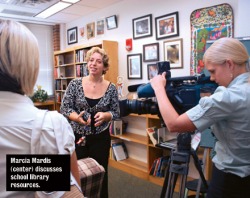 Marcia Mardis wants school libraries to continue being the center of learning. That’s why the assistant professor at Florida State University’s (FSU) School of Library and Information Studies is using a $400,000 grant from the Institute for Museum and Library Services to explore how K-12 media centers can integrate digital resources into their collections and services as quickly and easily as they collect traditional resources. A former library media specialist herself, Mardis will share her insight at the summit, where she's moderating the panel: "Leading 21st Century Skills with Your Collection: Infusing New Science Resources into Teaching, Learning, and Thinking"Saturday October 3 9:45 - 11 am and 11:15 a, to 12:30 pm Capitol Room A Hyatt Regency Washington Mardis's study is detailed in the September issue of SLJ. We spoke one on one with Mardis about the project: How did this study come about? When I was a media specialist at a science and math school, the Internet was just starting to explode and I had no good way to integrate all of the new science-related Web sites into my collection. Let's face it, the html "link farm" approach to collecting digital resources just doesn't cut it as an organization tool! I also have the great opportunity to work with the National Science Digital Library and want to get all of the great resources we have into the hands of teachers and students. I firmly believe that the best way to do this is to integrate them into the school library's collection What do you hope to achieve? This project reflects my desire to use these experiences to help media specialists increase their confidence with digital resources. In the first phase of the project, I will survey media specialists across the country about their current uses of and desires for digital resources. (SLJ readers—if you see an announcement about the survey, please take a moment to complete it!) Concurrent with the survey, I will work with programmers to develop a tool that digital library developers can use to alert people to resources in their digital libraries right from the desktop. Now, I'm thinking that the tool will probably be RSS-based. It will do more than just give them descriptions of the resources, it will include links to downloadable MARC records that can be ingested into the OPAC. Mardis hopes to develop the technology by February 2010 and start testing it in select schools in the spring. Librarians interested in piloting one of the programs can contact her this fall as she’s searching for volunteers. Email Mardis at [email protected]. “We’ll work with [the volunteers] to give them the confidence to collect more resources,” says Mardis. “And then, they’ll have the confidence to teach the teachers as well.”
Dear Summit Participants,
Welcome to the 2009 School Library Journal Leadership Summit. We are delighted you will join us October 2-3 for "Librarians as Leaders of 21st Century Learning.” This year we’re taking the summit to Hyatt Regency Washington in our national’s capitol, Washington, D.C.
At this year’s summit we will explore the powerful relationship between school librarians and 21st century skills, including information and communications skills; critical thinking; interpersonal and collaborative skills; global awareness; and financial, business, and civic literacy.
Nationally, the Partnership for 21st Century Skills (www.21stcenturyskills.org) has served as a catalyst to position 21st century skills at the center of K-12 education through partnerships among education, business, governmental and community leaders. Many states—from New Jersey to South Dakota—have become 21st century Leadership States. But even where states haven’t officially come on board, school districts and schools across the country are seeking ways to infuse teaching and learning with 21st century knowledge and skills.
Join SLJ, our presenting sponsors, leaders from across education and government, as well as nationally-known keynote speakers as we explore 21st century teaching and learning. This year’s summit not only promises to provoke and stimulate—with special surprises and receptions—but will also have a long-lasting impact on our profession.
We believe that the movement towards 21st century skills provides school librarians with an enormous opportunity. It will be the goal of this summit to seize this opportunity and articulate how the school librarian, as teacher, as well as the entire school library program enables 21st century learning. We will produce a document that maps the role of the school librarian to 21st skills—available in the pages of School Library Journal and through our sponsors.
So mark your calendars. You won’t want to miss Summit 2009.
Best Wishes,
Brian Kenney
Editorial Director
School Library Journal
|






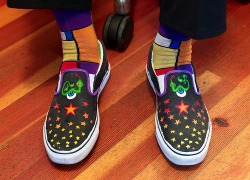



 RSS Feed
RSS Feed